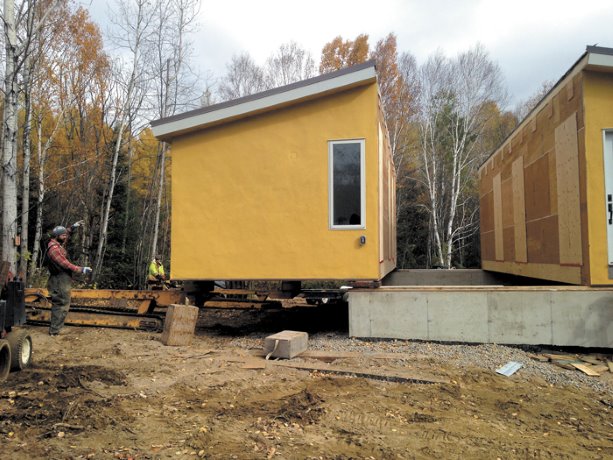How did a Guelph, Ont.-based green builder wind up supplying modular straw bale schoolhouses to the Pinoleville Pomo Nation in northern California? By following their market.
The company was founded in 2001 by Ben Polley as Harvest Homes, employing traditional straw bale and plaster construction techniques as a sub-contractor. The system involves stacking straw bales, then placing a cementitious plaster over the interior and exterior to create an ultra-efficient wall. Straw bale construction is rot-resistant, fire-resistant and offers an R40 insulation rating with few thermal bridges.
"Clients asked for traditional, natural or green building services that were not being provided by the market," says Polley.
"We told those clients that we would undertake the research and training required to complete the work at a discount because our first project would not be as efficient as we would wish to be. The market was telling us what it wanted and effectively paying for our training."
Work ranged from building domestic green roofs to designing and installing artificial wetlands for septic systems, creating adobe structures, using clay veneers in place of paint and building earthen outdoor bread ovens.
As the company’s expertise grew, two specialty divisions were co-founded in 2006 by Polley and Chris Vander Hout. Evolve Builders is a full-service general contractor offering green construction for turn-key additions, renovations and new construction. Fermata offers hand-sculpted earthen construction techniques, including natural plastering, adobe construction and the use of cob—a mixture of clay-rich earth, sand and straw. Today, the combined companies employ 23 workers.
Evolve’s first institutional project was completed for Orangeville’s Island Lake Public School in the Upper Grand District School Board, which had issued a bid request for a 2800-sq.-ft. standalone school building that included two classrooms, seminar space and two single washrooms.
"The bids from conventional school constructors came in way over budget," says Polley.
"To the school board’s credit, next asked for a design build concept that was out of the ordinary—and we were able to design and build it for less than the budgeted amount."
Conceived as a learning centre, the building’s green features are transparent to students and teachers and used as educational tools. The slab-on-grade building features timber frame construction, exposed rafters, straw bale insulation, polished concrete floors and a grey water collection system to flush toilets. The insulation is so efficient that, at times, no supplementary heat is required in winter.
"We were later contacted by the school board to build carbon copies of the building at two other locations," says Polley.
"We were then asked if we could adapt the same technologies to build a relocatable portable. We worked with them to develop a design that any school board can use. These are modular straw-bale buildings delivered to site in two halves for assembly. So far, we’ve installed two single modular classrooms for Upper Grand and one at the Ottawa-Carleton District School Board."
Built at the company’s facility in Durham, the modular portables are produced under the company’s mobEE (Mobile Eco-Enclosure) division, created in 2014.
"Traditional portables are depreciating assets the moment they’re set into place," says Polley. "We’re building permanent quality construction that happens to sit on a mobile chassis."
The California school project began with a call for bids by the Pinoleville Pomo Nation asking for a relocatable school structure built with straw.
"None of the portable straw bale or portable constructors in California offered what they wanted," says Polley. "I was absent the day the call came. If I’d taken it, I might have dismissed it as implausible that we could affordably put something together that we could ship to California. I called the tribe management back and it was like the anti-sales call. Every time I described constraints that would be really difficult to overcome, they would call back saying they had solved them."
The company produced six modules, complete with walls insulated with straw, floors and ceilings built with structural insulated panels, air source heat pumps and thermoplastic polyolefin reflective roofing membranes. Six flatbeds delivered the modules to California on a five-day journey. The building was assembled by members of the tribe on piers, and configured into two classrooms, a shared performance space and four small bathrooms.
Polley says that the company invested some time and money in the project that could not be fully recovered out of a sense of social dedication…coupled with a sense of achievement.
"We recognized that these will have been the furthest traveled structures of their kind anywhere in the world," says Polley. "That gave us a tinge of pride as well."






Recent Comments
comments for this post are closed